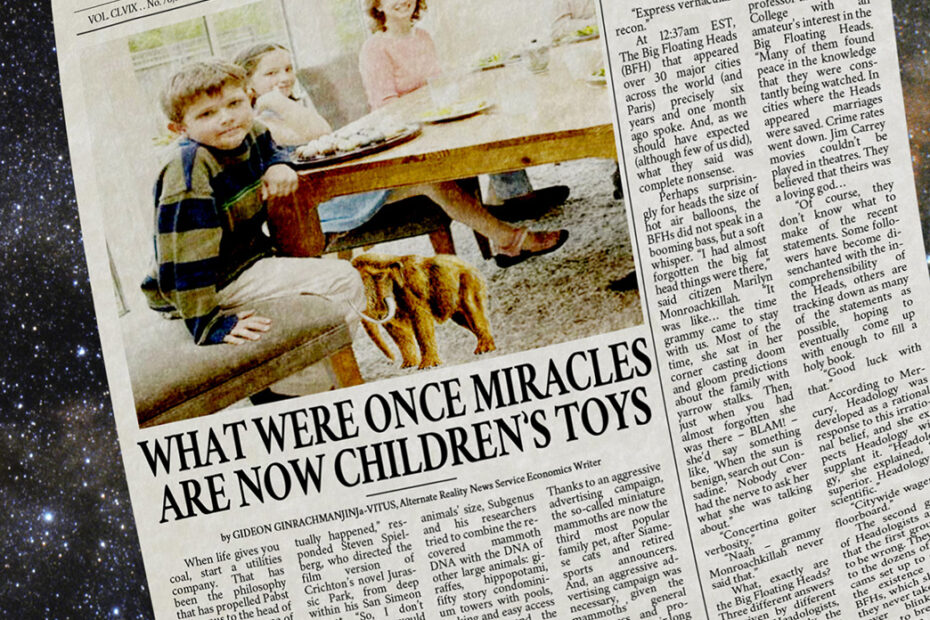by LAURIE NEIDERGAARDEN, Alternate Reality News Service Medical Writer
Clowns. Sure, they make some people laugh, but at what cost? They scare small children and haunt the dreams of impressionable adults. Most people, according to Statistics Canada’s Department of Vague Generalizations, consider clowns to be psychologically damaging and a drag on the economy. Is there anything that can tip public opinion back in favour of these once lovable scamps?
How about curing sexually transmitted diseases?
“Ve haff been getting ze most amazing results from our researches, jah?” claimed Jully Swedenborger, head of the Straneaushanswurst Institute in Redondo Beach, California. When it was pointed out to Swedenborger that he didn’t appear to be German, he dropped the outrageous accent and said, “Yeah, okay, but that doesn’t change the fact that our research has shown some amazing results, okay?”
How can clowns affect other people’s health? Apparently, their tears have healing properties not found in the tears of “straights,” non-clownic citizens. In clinical tests conducted over the past five years, researchers at the Straneaushanswurst Institute have shown that the tears of clowns ameliorate the symptoms of syphilis, gonorrhea and three different kinds of Herpes.
“Three types!” Swedenborger enthused. “Zat’s more zan – sorry, that’s more than antibiotics!”
According to Swedenborger’s research, you can’t just put on big shoes and a red nose and call yourself a clown for your tears to have any effect on people with sexually transmitted diseases. You have to have been a practicing clown for at least 6.37 years for your tears to have any effect. The most potent cure comes from the tears of people who have been clowns for over 20 years.
“We call this a high clownic,” Swedenborger dryly stated.
Swedenborger is waiting for approval from the Food and Drug Administration to begin offering the tears of a clown cure to the public. He envisions a system of tear banks where clowns anonymously donate their lacrimal emissions. The clown donor would enter a small room with a cup; the room would be filled with sad novels with unhappy endings and unfunny comedies on DVD. The clown would be encouraged to avail himself of the media and do what comes naturally until the cup is filled.
“Uh, yeah, I…I…I would be totally into, uhh, that,” commented a clown who asked to be identified only by the name Shakes. “Cry into a…a…a cup? I can, uhh, do that. How much does it pay?”
“Oh, no, no, no, no, no, no, no,” responded Claire Kane, noted children’s performer and woman considering starting the group Stop Clowning Around, a clown’s rights organization. “Selling our tears for money? That’s exploitation, that is. It…isn’t right.”
“Okay, so we don’t give them any money,” Swedenborger conceded.
“What?” Shakes shouted. “You, uhh, expect me to watch Pagliacci and…and…and cry into a cup for nothing?”
“Ahhh…uhh…I’m sure we can come to some reasonable accommodation on this,” Swedenborger unconvincingly replied. “Think of all the people who will lead happier, healthier lives thanks to this cure.”
“Think of the poor clowns,” Claire Kane asserted, “driven by economic need to sell their own tears. Month after month –”
“Day after day,” Shakes interjected.
“On a regular basis subjecting themselves to sadness,” Claire Kane smoothly continued. “How could this not stunt their – our emotional growth?”
“Stunt our emotional growth? Oh, please!” stated another clown known as Pennywise. “Clowns are inherently depressed – why do you think we have this insatiable need to make other people laugh? And, why do you think most children fear us? They know that deep down we’re miserable people. THEY KNOW.”
The Vatican issued a statement opposing the use of clown tears as a cure for sexually transmitted diseases. Cutting through all the rhetoric about the “sanctity of beloved comedic characters,” the underlying rationale for the Vatican’s position seems to be that sexual activity is immoral and those who engage in it deserve to suffer painful and lingering diseases.
“MIND YOUR OWN BUSINESS!” responded Shakes, Claire Kane and Pennywise.
While the issues play out in the court of clown opinion, science marches on. Early results of new research at the Straneaushanswurst Institute indicate that the snot of mimes has much promise as a cure for advancing dementia in the elderly.
“But, uhh, that’s kind of gross,” Swedenborger allowed, “so let’s wait until all of the tests come back before we get too excited about it.”


